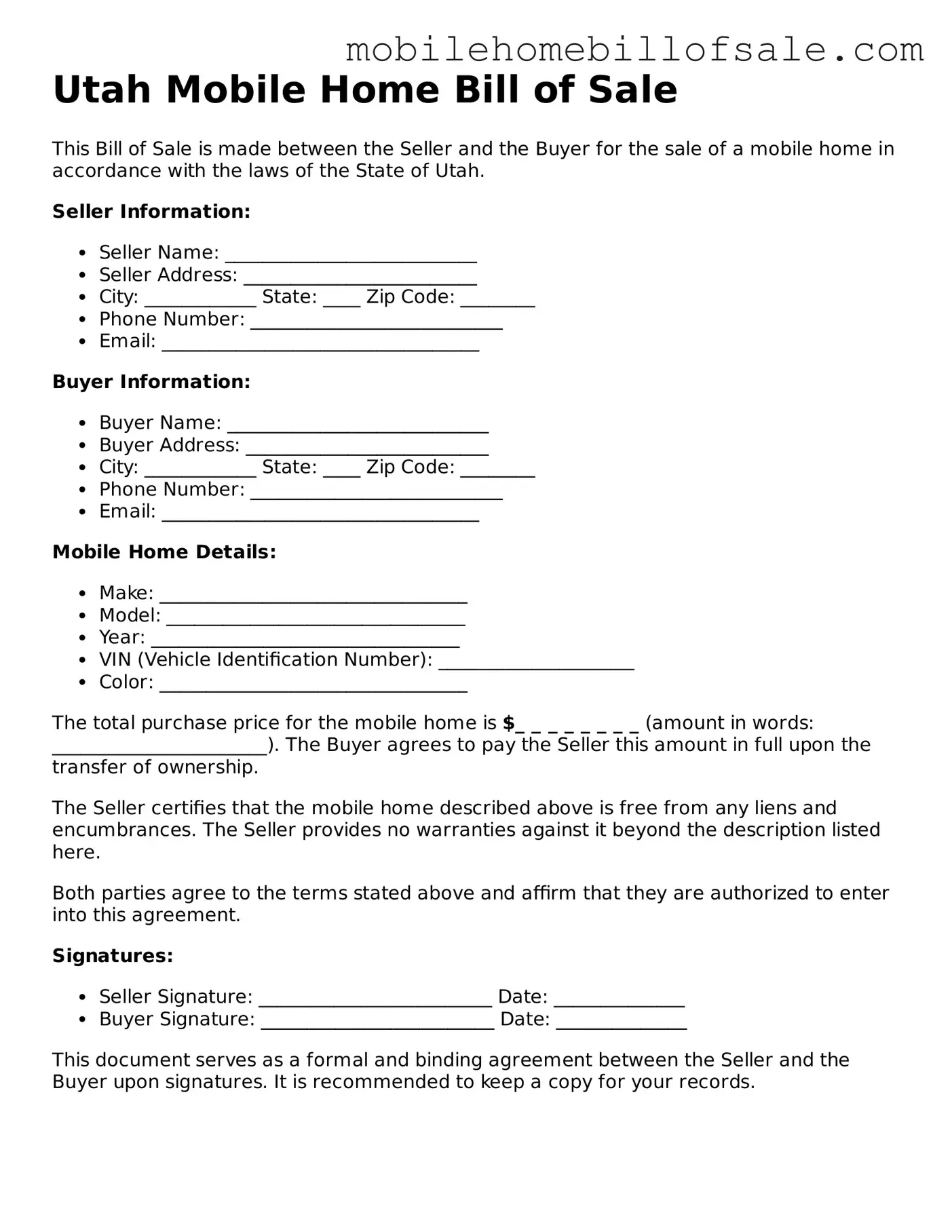The Utah Mobile Home Bill of Sale form is similar to a standard Vehicle Bill of Sale. Both documents serve as proof of transfer of ownership from one party to another. They include essential details such as the buyer's and seller's names, addresses, and signatures, along with a description of the item being sold. In both cases, the bill of sale can be used for registration purposes and may be required by state authorities to finalize the transfer process.
Another document that closely resembles the Mobile Home Bill of Sale is the Boat Bill of Sale. Like the mobile home version, this document outlines the transaction between the buyer and seller of a boat. It includes information about the vessel, such as its make, model, and identification number. Both forms are essential for establishing legal ownership and may be required for registration with the appropriate state agency.
The RV Bill of Sale is also similar to the Mobile Home Bill of Sale. When purchasing or selling a recreational vehicle, this document captures the details of the transaction, including the parties involved and the vehicle's specifications. Just like the mobile home form, it serves as a legal record of the sale and may be necessary for registration or titling purposes.
A Lease Agreement can be compared to the Mobile Home Bill of Sale in that it outlines the terms of occupancy for a mobile home. While a bill of sale indicates ownership transfer, a lease agreement establishes the rights and responsibilities of the tenant and landlord. Both documents protect the interests of the parties involved and provide clarity on the terms of use.
The Warranty Deed is another document that shares similarities with the Mobile Home Bill of Sale. A warranty deed transfers ownership of real property and guarantees that the seller has clear title to the property. While the Mobile Home Bill of Sale focuses on personal property, both documents ensure that the transfer of ownership is legally recognized and enforceable.
A Purchase Agreement for real estate also bears resemblance to the Mobile Home Bill of Sale. This agreement details the terms of a property sale, including price, financing, and contingencies. Both documents serve to formalize the transaction and protect the interests of the parties involved, ensuring that all necessary information is documented and agreed upon.
The Title Transfer form is akin to the Mobile Home Bill of Sale, as it facilitates the legal transfer of ownership for various types of property, including vehicles and mobile homes. This document is often required by state authorities to update the official records of ownership. It ensures that the new owner is recognized and can legally operate or reside in the property.
The Affidavit of Heirship is another document that may relate to the Mobile Home Bill of Sale, particularly in cases where ownership is transferred after the death of the owner. This affidavit serves to establish the rightful heirs of the property, ensuring that the transfer of ownership is legitimate. Both documents are crucial in clarifying ownership and protecting the rights of the new owner.
In some cases, a Power of Attorney can be compared to the Mobile Home Bill of Sale when it comes to the transfer of ownership. A Power of Attorney allows one person to act on behalf of another in legal matters, including the sale of property. While the bill of sale documents the transaction, the Power of Attorney authorizes someone else to execute that transaction on behalf of the owner.
Finally, a Security Agreement can be related to the Mobile Home Bill of Sale when financing is involved in the purchase of a mobile home. This document outlines the terms of a loan and secures the lender's interest in the property until the loan is paid off. Both documents play important roles in the transaction, ensuring that the seller's rights are protected while the buyer secures financing for their purchase.

